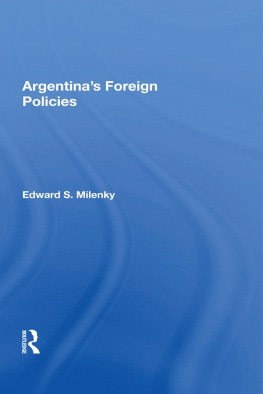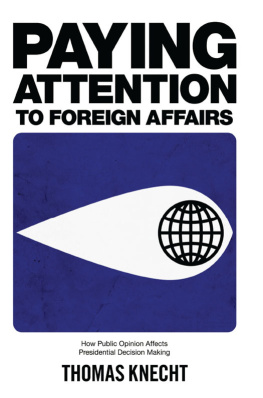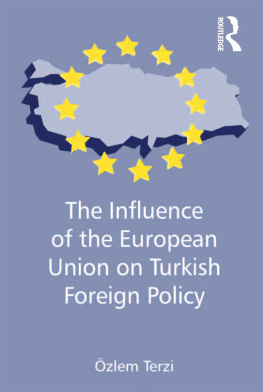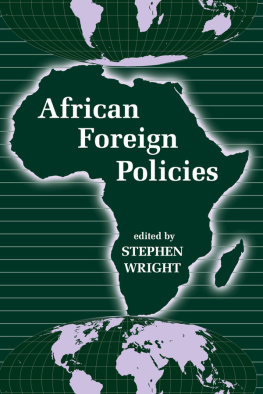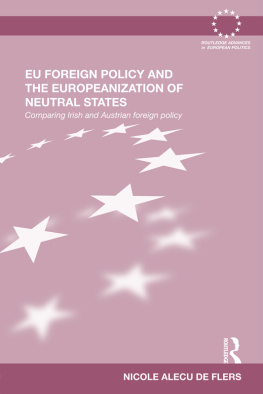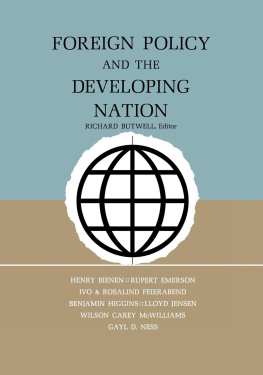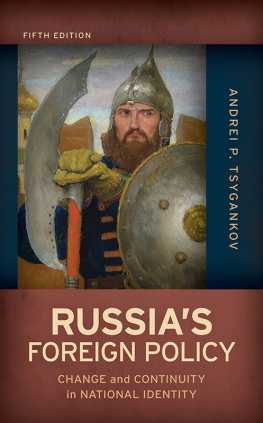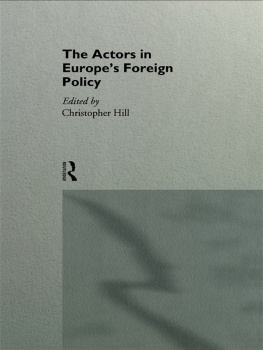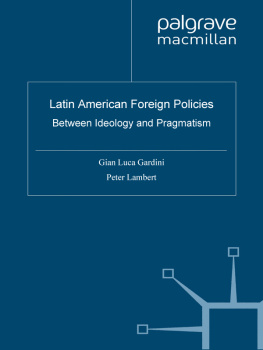First published 1978 by Westview Press
Published 2019 by Routledge
52 Vanderbilt Avenue, New York, NY 10017
2 Park Square, Milton Park, Abingdon, Oxon OX14 4RN
Routledge is an imprint of the Taylor & Francis Group, an informa business
Copyright 1978 by Taylor & Francis
All rights reserved. No part of this book may be reprinted or reproduced or utilised in any form or by any electronic, mechanical, or other means, now known or hereafter invented, including photocopying and recording, or in any information storage or retrieval system, without permission in writing from the publishers.
Notice:
Product or corporate names may be trademarks or registered trademarks, and are used only for identification and explanation without intent to infringe.
Library of Congress Number: 77-90536
ISBN 13: 978-0-367-02100-9 (hbk)
To my late father, Joseph Milenky --
my first and best teacher on the realities of human nature
Argentinas Foreign Policies
Westview Replica Editions
This book is a Westview Replica Edition. The concept of Replica Editions is a response to the crisis in academic and informational publishing. Library budgets for books have been severely curtailed; economic pressures on the university presses and the few private publishing companies primarily interested in scholarly manuscripts have severely limited the capacity of the industry to properly serve the academic and research communities. Many manuscripts dealing with important subjects, often representing the highest level of scholarship, are today not economically viable publishing projects. Or, if they are accepted for publication, they are often subject to lead times ranging from one to three years. Scholars are understandably frustrated when they realize that their first-class research cannot be published within a reasonable time frame, if at all.
Westview Replica Editions seem to us one feasible and practical solution to the crisis. The concept is simple. We accept a manuscript in camera-ready form and move it immediately into the production process. The responsibility for textual and copy editing lies with the author or sponsoring organization. If necessary we will advise the author on proper preparation of footnotes and bibliography. The manuscript is acceptable as typed for a thesis or dissertation or prepared in any other clearly organized and readable way, though we prefer it typed according to our specifications. The end result is a book produced by lithography and bound in hard covers. Edition sizes range from 200 to 600 copies. We will include among Westview Replica Editions only works of outstanding scholarly quality or of great informational value and we will exercise our usual editorial standards and quality control.
Argentinas Foreign Policies
Edward S. Milenky
The crises of industrialization and nation building have produced varying foreign policies and associated domestic images in Argentina. Classic liberals see the country as a Western, European society whose difficulties will be resolved through fuller and more effective participation in world affairs. Statist nationalists see a dependent, developing country that must strive for greater self-sufficiency and a new international political and economic order in alliance with the Third World. Since the 1940s Argentina has pursued one or the other of these alternatives under the guidance of various power blocs and interest groups.
Dr. Milenky examines and analyzes the foreign policies of Argentina as an independent actor in world affairs, taking into account both the policymaking process and the content of diplomacy. Presenting Argentina as a case study of the Latin American countries changing role in international politics and the implications of these changes for U.S. foreign policy and the international system, the author concludes that, while Argentina is a nearly developed country economically, it is politically immature. He explains both international behavior and domestic political upheaval in terms of the conflict between efforts to construct the classic, self-sufficient nation-state and the arrival of an age of interdependence in which this goal may well be unachievable at an acceptable price.
Edward S. Milenky is with the International Affairs Office, Energy Research and Development Administration. He has twice been a visiting researcher at the Inter-American Development Banks Buenos Aires Institute for the Integration of Latin America, and has been a researcher on Argentine foreign policy for the U.S. Department of State.
This work examines Argentina as an independent actor in world affairs, a case study in the changing international role of Latin American countries, and as an example useful for understanding the international system from the perspective of middle powers and developing countries. These objectives are approached by focusing intensively on the 19731976 period when both the international system and Argentina passed through important transitions. Historical and analytical depth are enhanced with additional coverage of diplomatic tradition and the governments which preceded and followed the main period of interest. In the future I plan a more comprehensive study of the Latin American international sybsystem and its place in world politics to deal with the more theoretical questions of this largely unexplored field.
Many individuals and institutions helped to make this book possible. An Organization of American States Post-Doctoral Fellowship supported field research in Buenos Aires, Montevideo, and Santiago during June, July, and August 1975. The Buenos Aires-based Institute for the Integration of Latin America, INTAL, provided splendid research facilities and the support of its professional staff. Dr. Felix Pena, now director of INTAL, and Dr. Luciano Tomassini, special advisor, were especially generous with their time and hospitality. Dr. R. Alberto Calvo, formerly director of INTAL and now with the Inter-American Development Bank; Dr. Jos Cardenas, formerly alternative executive director of the IDB; and Mr. Nestor Vega Moreno, formerly submanager for integration, also assisted me in making arrangements for my work in Buenos Aires. Several other persons with extensive experience in international affairs consented to be interviewed for this study during my stay in Buenos Aires but have preferred that their names not be mentioned here.
In Montevideo and Santiago I was also most fortunate in receiving generous, open-handed cooperation with my research from many persons who gave freely of their expertise and their friendship. In a number of cases I was able to talk with persons whom I first interviewed for a study of Latin American integration in 1970 and to note how greatly conditions have changed since then. Many are with various international agencies, others with governments, others retired from government service. Had they not preferred anonymity I would name them here. They are of course in no way responsible for the conclusions reached in this book.
Under a contract with the Office of External Research of the Department of State I completed an early version of this work in April 1975. Financial support from this office enabled me to do extended research at the Library of Congress and other Washington area libraries and to interview numerous persons in the Washington area with extensive experience in Argentine affairs.
During extended residence in 1970 and 1975 my family and I acquired a deep affection for Argentina. Our many friends in Buenos Aires made us feel part of the family and helped us to understand Argentine society in its own terms. In particular my thanks go to Julio and Nucha, Rodolfo and Claudia, Paco and Elsa, Jorge and Susi, Roque and Cristina, Monie and Blanca, Hugo, Emilia, and Edith. If this book promotes a closer friendship between our two peoples then it will have achieved its most important objective.

